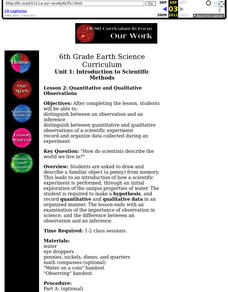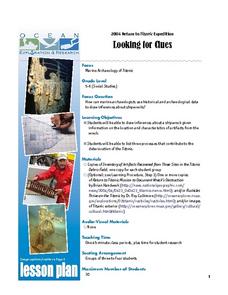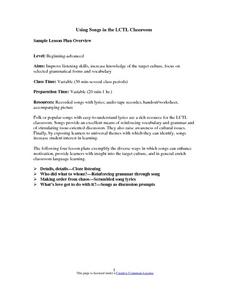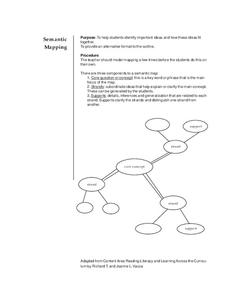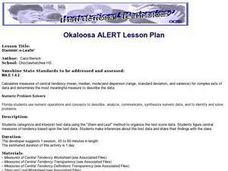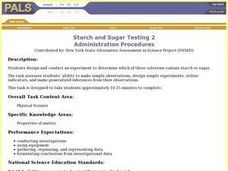Curated OER
Introduction to Scientific Methods
Sixth graders distinguish between an observation and an inference distinguish between quantitative and qualitative observations of a scientific experiment. They record and organize data collected during an experiment.
Curated OER
Mr. Cobbler's Shoe Dilemma
Students employ statistics to solve real-world problems. They collect, organize and describe data. They make inferences based on data analysis. They construct, read, and interpret tables, charts and graphs.
Curated OER
Acid and Base Testing 2
Pupils design and conduct an experiment on unknown solutions after studying descriptions of indicators and the way in which they identify acids and bases. Students must gather, organize, and analyze data as well as make inferences about...
Curated OER
Dig It Up
Young scholars participate in an archaeological excavation to determine how archeologists make inferences about various cultures. They reconstruct the site using layers of drawings. They discuss the kinds of information they learned.
Curated OER
The Dog Days of Data
Students are introduced to the organization of data This lesson is designed using stem and leaf plots. After gather data, they create a visual representation of their data through the use of a stem and leaf plot. Students
drawing...
Curated OER
Titanic: Looking for Clues
Students make inferences about a shipwreck based on the location of artifacts. They role play as marine archaeologists and list three processes that contribute to the deterioration of the Titanic.
Curated OER
Decision Making
Students study weather patterns and learn to make decisions based on the weather. In this weather lesson, students plan a potluck based on the weather. Students use a decision tree to brainstorm about the activity. Students complete a...
Curated OER
The Beaufort Scale: A Local Model
Students study the Beaufort Scale and use it to study wind in their community. In this wind study lesson, students watch a DVD about climate change and learn about the Beaufort Scale. Students complete a worksheet for the topic.
Curated OER
Earth Composition and Plate Tectonics
Pupils investigate the composition of the interior of the Earth through a teacher lead lesson plan. They study the theory of plate tectonics before creating a model of the earth's interior. They use a hard boiled egg to synthesize a...
Curated OER
Using Songs in the LCTL Classroom
Young scholars in a beginning to intermediate foreign language/ESL classroom complete a variety of activities involving music and lyrics that are designed to enhance their listening and vocabulary skills. They practice grammar and making...
Curated OER
Circles Minilab
Students learn how to measure the diameter and circumference of a circle. In this circle lesson, students organize their data to create a graph. Students utilize their graph to make an inference about the slope of pi.
Curated OER
Is It There?
Students participate in a lesson designed to illustrate these concepts using simple materials. They use Science process skills to observe, measure, predict, make inferences, and communicate while completing the activity. Proper safety...
Curated OER
Colored Dots 1
Students observe that colored markers are a mixture of many different colors by performing a chromatography experiment. They make observations, record information, and make generalized inferences from their observations.
Curated OER
Layering the Air
Students study the layer of the atmosphere. In this lesson on the atmosphere, students discuss the composition of the air around us and how the atmosphere was formed. Students create a scale model of the layers of the atmosphere.
Curated OER
Go Jump In The Lake!
Learners experiment with local lake water to determine the health of the lake waters. They explore the human impact on the lake water, hypothesize and share inferences in a scientific report.
Curated OER
Learning From Leaves: A Look at Leaf Size
Students measure and analyze leaves from various environments. They discuss the environments, and make inferences about environmental variables that could have contributed to the differences in leaf size and texture.
Curated OER
Experiences and Experiments - There is a Difference
Sixth graders plan and conduct an experiment on food spoilage. They design the experiment, create a display, record and analyze data, and make inferences regarding the results of the experiment.
Curated OER
Semantic Mapping
Students explore semantic mapping. Through teacher modeling and independent practice they complete a variety of semantic (concept) maps to coincide with specific areas of subject matter. They identify the core concept and include...
Curated OER
Stemmin'-n-Leafin'
Students make stem and leaf charts to determine the measures of central tendency using test score data. They analyze the data to draw inferences which they share with the class. They complete the associated worksheets.
Curated OER
Immigration/Migration
Sixth graders investigate the immigration into America by researching Ellis Island. In this United States History lesson, 6th graders research the Internet to view photographs and find information about the immigration to Ellis Island....
Curated OER
Sound Box
Students make simple observations and identify relevant variables, such as frequency and diameter. They then discuss the relationship between variables. The task assesses students' abilities to make simple observations and make...
Curated OER
Starch and Sugar Testing 2
Students design and conduct an experiment to determine which of three solutions contain starch or sugar. This task assess students' ability to make simple observations, design simple experiments, utilize indicators, and make generalized...
Curated OER
Keep It Cool
Students complete a science experiment to study insulation, heat transfer, and permafrost. In this permafrost study lesson, students design and test a soda insulator. Students graph their class data and discuss the results. Students...
Curated OER
Chocolate and Ice Cream Across the Curriculum
Sixth graders in a special education class discuss excerpts of two stories and read biographical information on the authors. In groups, they read the full text of both stories and try to solve the mystery as they read. They practice...
Other popular searches
- Teaching Inference Skills
- Inference Skills First Grade
- Reading Inference Skills
- Powerpoint Inference Skills
- Inference Skills in Reading
- Inference Skills Worksheet
- Science Inference Skills
- Inference Skills Sixth Grade
